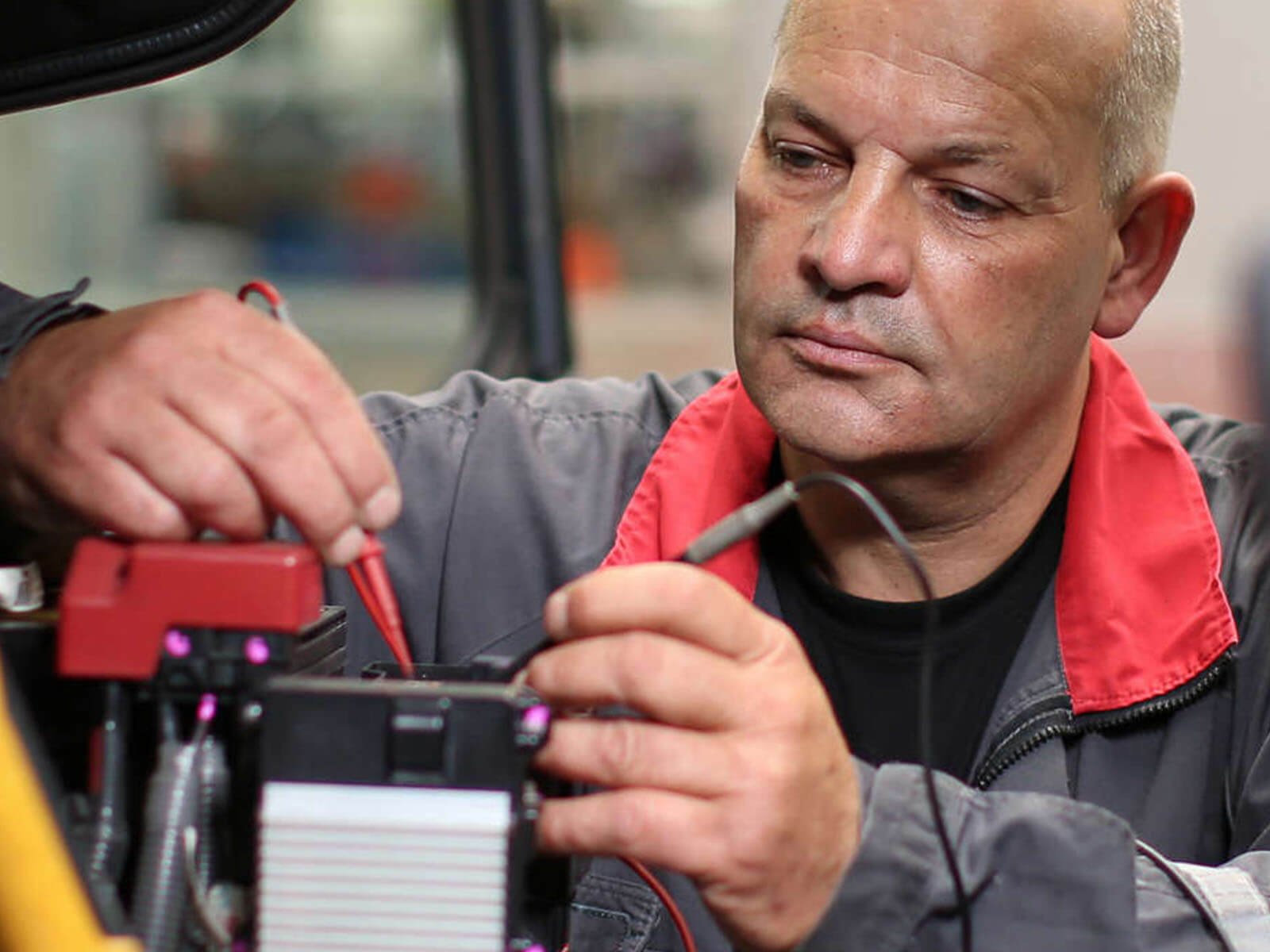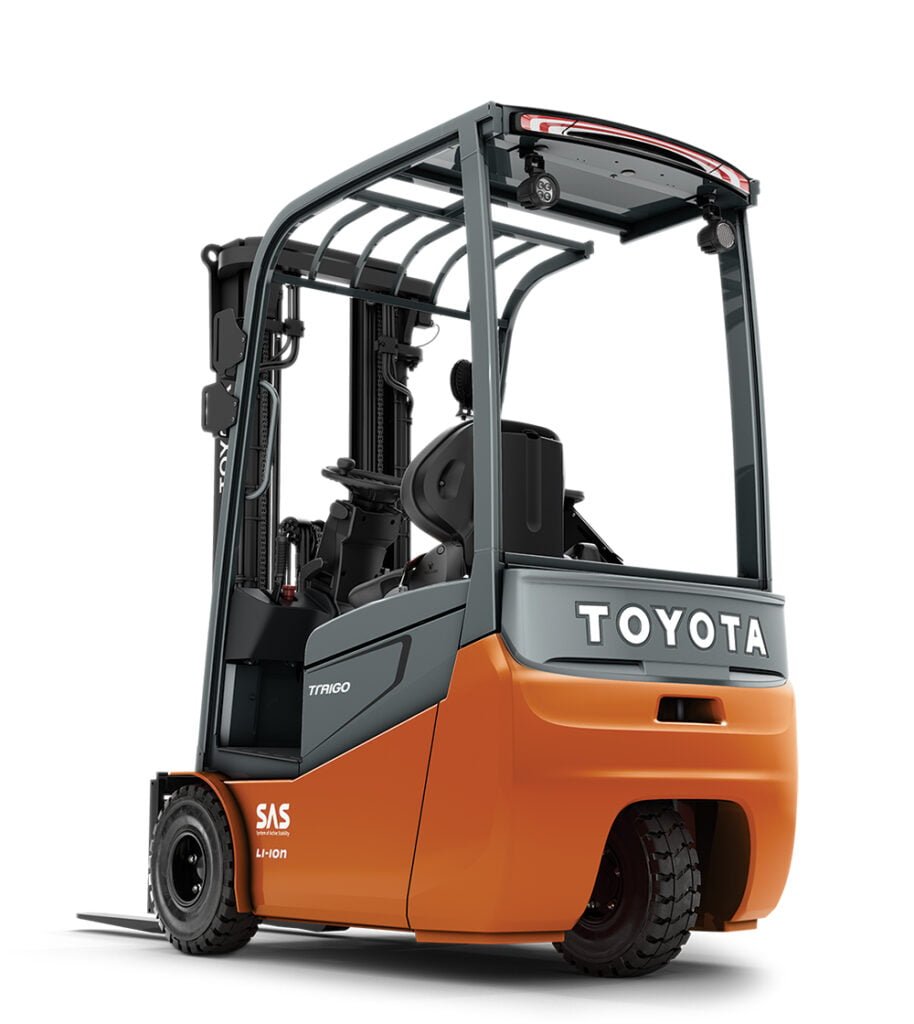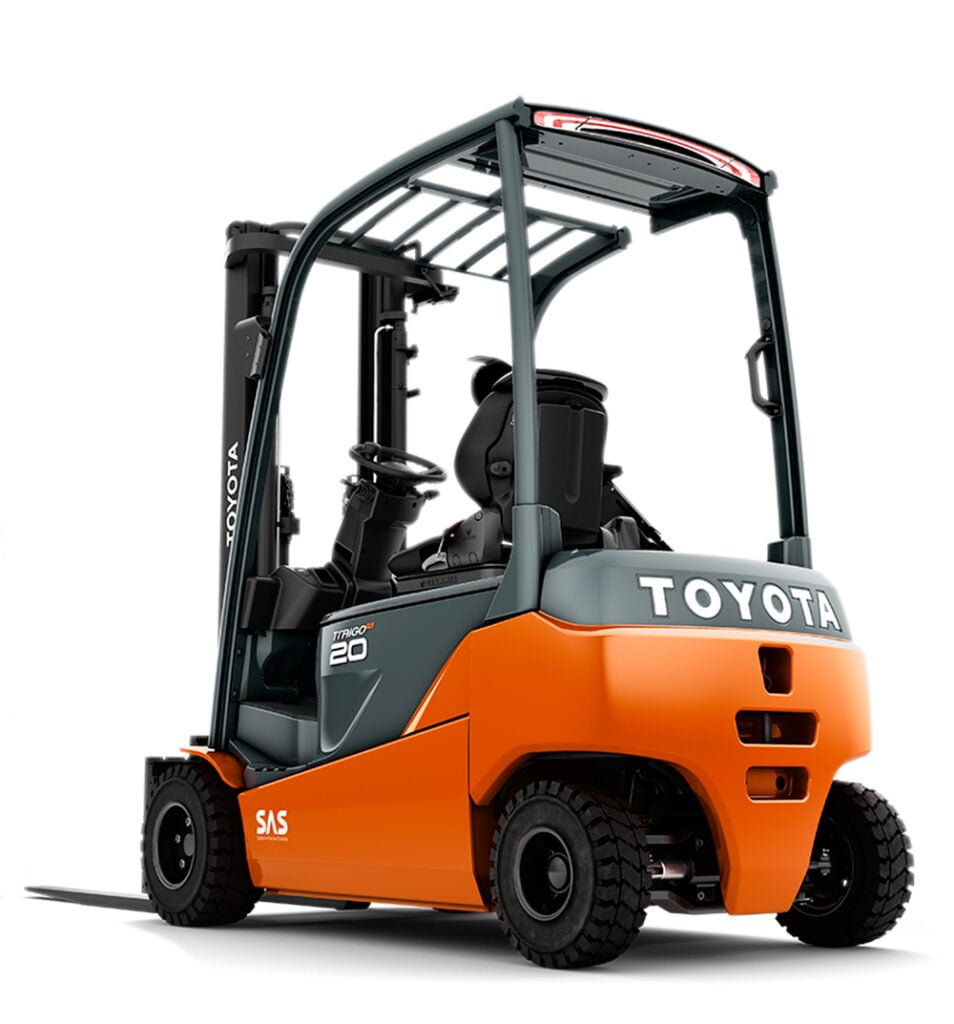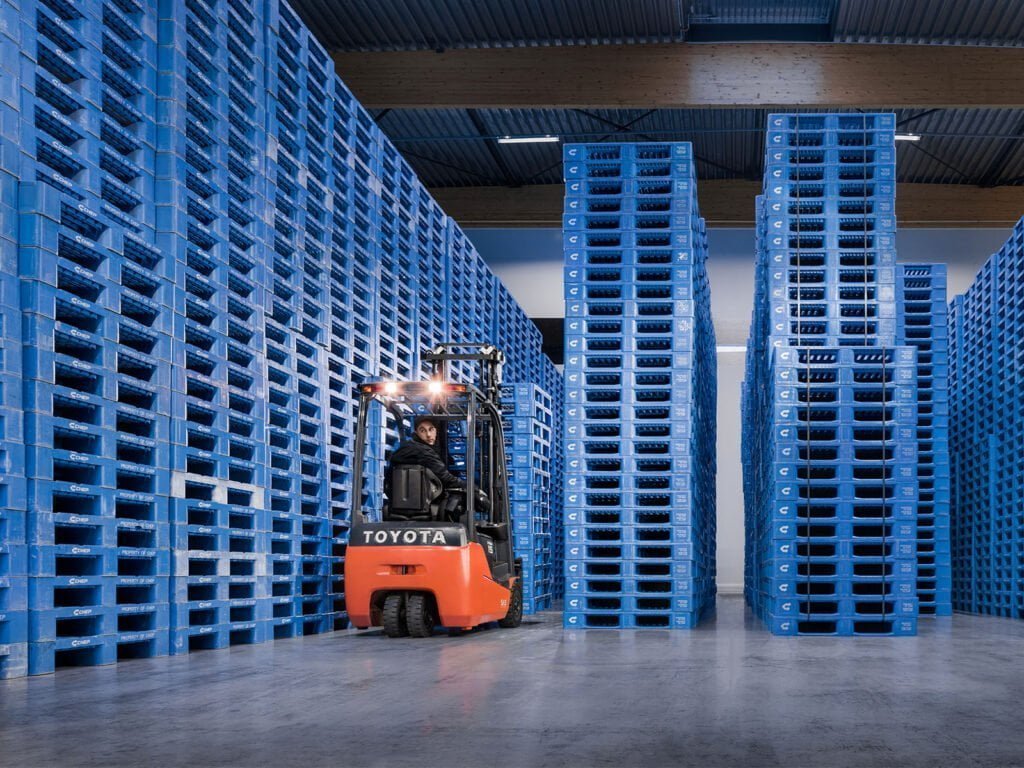
What You Need To Know: Electric Counterbalance Forklifts
If you’re thinking about switching to electric counterbalance forklifts from Internal Combustion Engine (IC) trucks, you’re making a smart move.
Our Electric Counterbalance Forklifts operate quietly, emit no pollutants, and excel in tight spaces—perfect for warehouses and retail environments. With lower maintenance needs and strong lifting capabilities, they stack up well against traditional internal Combustion (IC) models. Their safety features and operational costs are also key factors to consider. So, what makes electric counterbalance forklifts stand out today? Let’s take a closer look.


What Is an Electric Counterbalance Forklift?
Electric counterbalance forklifts are transforming material handling. Powered entirely by electricity, they offer a cleaner, quieter alternative to gas and diesel models. These forklifts use battery-powered motors, making them ideal for enclosed spaces where noise and emissions are an issue.
What really sets them apart is their compact design and manoeuvrability. They’re perfect for navigating crowded aisles and handling loads in tight spaces. Many models, like the Toyota Triago Range, can lift heavy weights while staying agile.
What Are the Benefits of an Electric Counterbalance Forklift?
Electric counterbalance forklifts offer several benefits to improve material handling:
Lower Running Costs
Once you invest in an electric forklift, your primary ongoing cost is electricity for charging, eliminating the need for constant refuelling. This leads to significant savings over time, along with fewer safety measures compared to gas or diesel models.
Versatility
Electric forklifts are available in various sizes, and capable of handling a range of tasks. From compact models designed for navigating tight spaces to larger options for heavy-duty lifting, there’s a solution for every operational need.
Quiet Operation
Their quiet performance not only reduces noise pollution but also improves safety by allowing workers to clearly hear alarms, backup signals, and other important sounds.
Safe for Indoor Use
Electric forklifts produce zero emissions, creating a cleaner, healthier environment for indoor workspaces, and protecting both employees and products from harmful fumes.
Easy to Operate
With no complicated transmissions or clutch systems, electric forklifts are straightforward to use, making them more accessible to operators of all skill levels.
Three-Wheel vs. Four-Wheel Electric Forklifts

Three-Wheel Models: Three-wheel electric forklifts are perfect for navigating tight spaces, making them highly effective in retail and high-density environments. Their compact design and tight turning radius allow for quick manoeuvring in narrow aisles, boosting efficiency in fast-paced settings where space is limited and agility is key. View our 3 Wheel Electric Forklift Range.
Four-Wheel Models: Four-wheel electric forklifts offer greater stability, making them ideal for handling heavier loads and outdoor tasks. Their robust design ensures smoother operation on uneven surfaces, providing better traction and control. This makes them suitable for demanding environments like construction sites or larger manufacturing facilities. View our 4 Wheel Electric Forklift Range.

What Environments Use Electric Fork Trucks?
Electric counterbalance forklifts are ideal for businesses where emissions and noise are a concern. They excel in environments like:
- Supermarket Warehouses
Supermarket warehouses often handle perishable goods and high stock turnover, making air quality a priority. Electric counterbalance forklifts are ideal because they emit no pollutants, keeping food items safe while reducing ventilation needs. Their quiet operation helps minimise disruption in busy environments where communication is crucial. With their compact design, they can navigate tight aisles efficiently, enhancing productivity without compromising safety.
- Food and Drink Production Facilities
In food and drink production, cleanliness and safety are critical. Electric forklifts eliminate the risk of exhaust fumes contaminating products, ensuring a safe and hygienic working environment. Their quiet and smooth performance also helps maintain focus in production areas. Additionally, they require less maintenance, reducing downtime and ensuring that operations remain efficient and uninterrupted.
- Fisheries
Fisheries require forklifts that can handle delicate, perishable products in confined and often damp indoor areas. Electric forklifts are perfect here as they produce no emissions, keeping the air fresh and safe for food handling. Their ability to move quietly is an added benefit, preventing unnecessary stress to workers in these often busy and tightly packed environments. Their compact design allows them to manoeuvre effectively in small spaces, making daily operations smoother.
Their compact design makes them perfect for busy, confined spaces. While not always the best for heavy-duty outdoor tasks, electric forklifts can complement gas or diesel models in a mixed fleet.

What Industries Would Benefit Most From Electric Forklift Technology?
Electric forklifts benefit industries like:
- Retail and eCommerce
In the fast-paced world of retail and eCommerce, quick access to products and efficient order fulfilment is crucial. Electric counterbalance forklifts excel here with their agility and precision in handling varied loads. Their ability to move swiftly and quietly through busy warehouses ensures seamless picking and packing operations, reducing delays and keeping up with high demand. The zero emissions also contribute to a cleaner, safer environment for staff working long hours in indoor settings.
- Construction and Manufacturing
Electric forklifts are the perfect choice for indoor tasks in construction and manufacturing environments. While gas-powered forklifts handle the outdoor, heavy-duty work, electric models shine indoors where ventilation may be limited. Their emissions-free operation helps maintain air quality, while their quieter performance reduces noise in enclosed spaces, enhancing safety. Their compact design allows them to manoeuvre around machinery and workstations efficiently, ensuring smooth workflow and less disruption.
- Warehouse Storage
In warehouse storage settings, electric forklifts are an essential part of a well-organised material handling system. Their precise control and compact design allow for quick navigation through narrow aisles and tight storage areas, improving pallet management. Pairing electric forklifts with pallet trucks creates an efficient solution for loading, unloading, and stacking goods, all while maintaining an eco-friendly, low-noise operation that helps reduce the overall cost of warehouse operations.
What are Electric Forklift Maintenance Tips?
Maintaining your electric forklift is key to ensuring it runs smoothly. Pay attention to:
Battery Maintenance
Proper battery care is essential for electric forklifts to ensure longevity and efficiency. Lead-acid batteries require regular water level checks and topping up with distilled water to prevent sulfation. Lithium-ion batteries, while more low-maintenance, still need to be used correctly—following proper charging cycles and avoiding overcharging helps extend their lifespan and maintain consistent performance.
Regular Checks
Routine inspections are key to keeping your forklift running smoothly. Check critical components like motor cables, brakes, tires, and hydraulics to spot any potential issues early. Additionally, always charge the battery fully and on time, and watch for signs of low battery, such as dim headlights or reduced power, to prevent operational disruptions.
For more Tips and Tricks for Forklift Longevity check out some tips from one of our maintenance experts. Rich’s Tips for Forklift Longevity.

Electric Forklifts vs. Combustion Forklifts
Comparing electric and gas forklifts? Here’s what you need to know:
Fuel vs. Electricity
Gas forklifts depend on fuels like gasoline, diesel, or LPG, which require constant refuelling and can add to operational costs. Electric forklifts, on the other hand, run on rechargeable battery systems, easily powered by standard outlets. This not only simplifies refuelling but also reduces fuel expenses, making them a cost-effective and sustainable option for long-term use.
Maintenance
Electric forklifts come with fewer moving parts compared to gas-powered models, which means less wear and tear over time. With no complex engine components like fuel tanks or exhaust systems, maintenance costs are significantly lower. This reduces both downtime and repair frequency, offering increased reliability and smoother day-to-day operations.
Emissions
One of the biggest advantages of electric forklifts is their zero-emission operation, making them far safer for indoor use. Unlike gas forklifts, which produce exhaust fumes, electric models maintain clean air quality, creating a healthier work environment and reducing the need for ventilation systems in enclosed spaces.
Safety Tips for Electric Counterbalance Forklifts
To keep operations safe:
Pre-Use Inspections
Before operating an electric forklift, it’s essential to carry out a thorough inspection. Check for any signs of wear or malfunction, such as leaks, faulty brakes, or damaged cables. Identifying issues early prevents breakdowns and ensures the forklift operates safely throughout the day.
Safety Gear
Operators must always wear the correct safety gear, including hard hats, safety glasses, and steel-toe boots. These precautions protect against potential hazards, such as falling objects or accidental collisions, and ensure a safe working environment.
Cautious Driving
To maintain safety, operators should drive smoothly, avoiding sudden stops or turns that could destabilise the load. It’s also crucial to keep loads within the forklift’s weight limit to prevent tipping or equipment damage, ensuring safer handling of materials.
Is an Electric Forklift Right for Your Business?
Electric forklifts are perfect for businesses focused on indoor use and zero emissions. They offer versatility, handling loads from 1.8T to 8T, making them ideal for tight indoor spaces and even some outdoor tasks. Our team is ready to assist with any questions and help you choose the right fleet. Take advantage of our free fleet survey—get in touch with us today!
Conclusion
Electric counterbalance forklifts offer businesses an efficient, eco-friendly option with minimal maintenance and lower operating costs. Whether you’re looking to enhance operations in a warehouse or retail setting, these forklifts could be the game-changer your business needs.
Electric Counterbalance Forklift – Frequently Asked Questions
Electric forklifts offer several benefits, including lower operating costs, zero emissions, and quieter operation. They also require less maintenance, which helps businesses save money in the long run. If you’re considering a more cost-effective solution, switching to electric might be the right move for your business.
Although electric forklifts are primarily designed for indoor use, some models are equipped to handle outdoor tasks, especially with features like all-terrain tires and weatherproofing. For businesses that require both indoor and outdoor functionality, contact Easy Truck to explore your options.
The time it takes to charge an electric forklift depends on the battery and charger type. Standard charging takes about 8-10 hours, while fast charging can reduce this to 2-4 hours. For businesses running multiple shifts, opportunity charging during breaks can reduce downtime.
With proper maintenance, an electric forklift battery can last between 5 and 7 years. Practices like regular charging and monitoring charge levels can help extend battery life. If you’re unsure about your battery maintenance, Easy Truck offers tailored guidance.
Yes, electric forklifts are built to handle a wide range of load capacities. Whether you need a forklift for lighter tasks or for lifting heavy loads, there’s a suitable electric model. Easy Truck can assist you in selecting the right forklift for your needs.
Electric forklifts are just as powerful as gas or diesel models. Many high-capacity electric forklifts are available for heavy-duty tasks, offering performance with the added benefit of lower emissions. Contact Easy Truck to explore powerful electric models for your business.
While electric forklifts may come with a higher initial cost due to the battery, they offer long-term savings on fuel and maintenance. Over time, these savings can outweigh the upfront investment. Easy Truck provides flexible financing options to help make the transition easier.
Yes, electric forklifts can operate in cold environments, though extreme cold can impact battery performance. Cold storage packages are available to ensure they perform well in lower temperatures.
Electric forklifts typically require less maintenance than gas or diesel models. Key tasks include checking the battery, tires, and brakes, and ensuring proper charging practices. Easy Truck offers comprehensive maintenance plans to keep your fleet running smoothly.
In some regions, government incentives are available to encourage businesses to adopt electric forklifts, reducing the initial purchase cost. Easy Truck can help you understand what incentives are available and how to take advantage of them.
Yes, electric forklifts can be customised with various attachments and configurations to meet specific operational needs. Whether you’re in warehousing, manufacturing, or retail, Easy Truck can help you find a solution tailored to your business.
Regenerative braking is a feature in electric forklifts that converts kinetic energy into electrical energy during braking, which recharges the battery. This system improves energy efficiency and extends battery life.
Yes, electric forklifts are ideal for food handling and pharmaceutical environments due to their zero emissions, which ensures clean and safe working conditions. They are the preferred choice for operations that prioritise hygiene and air quality.
Electric forklifts generally use either lead-acid or lithium-ion batteries. Lead-acid batteries are more cost-effective, while lithium-ion batteries offer faster charging and a longer lifespan. Unsure which one suits your needs? Easy Truck can help you decide.
Yes, most electric forklifts can be equipped with telematics, providing real-time data on usage, performance, and location. These systems improve fleet management. Easy Truck can guide you in integrating telematics into your fleet for optimised operations.